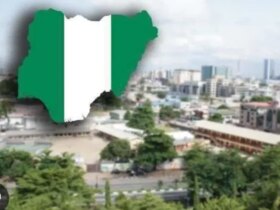Nigeria at 65: A Journey of Hope and Boundless Possibilities by Stephanie Shaakaa

*Reflecting on each decade from 1960 through the 2020s and envisioning the path forward
From political upheavals to cultural milestones, soaring food prices to global music icons, Nigeria’s journey since independence is a tapestry of resilience and transformation. This narrative spans six decades of challenges and achievements, heartbreaks and celebrations, all woven into the collective spirit of a nation. This is more than history-it is the pulse of Nigeria’s identity.

On October 1, 1960, Nigeria emerged as a new sovereign entity. Sixty-five years on, the nation continues its complex journey. The British flag was lowered, replaced by the Green White Green, as the anthem of freedom echoed across a hopeful land. The atmosphere was charged with anticipation, as a people long subjected to colonial rule embraced the dawn of self-determination.
Yet, independence was merely the beginning. What unfolded was a saga of aspirations and setbacks, endurance and despair, moments of pride and episodes of pain. To grasp Nigeria at 65 is to traverse its decades-long odyssey-a test of its people’s fortitude and the nation’s very essence.
The 1960s: Hope and the Tragedy of Civil Conflict
The decade opened with optimism. Visionaries like Nnamdi Azikiwe, Ahmadu Bello, Obafemi Awolowo, and Tafawa Balewa embodied the dreams of unity, prosperity, and democratic governance. However, the fragile federation soon buckled under ethnic tensions, mistrust, and corruption.
By 1966, military coups dismantled the fledgling republic, replacing democratic processes with force. The subsequent Biafran War (1967-1970) devastated the nation, claiming over a million lives and leaving deep wounds. The 1960s closed not with the jubilation of freedom, but with memories of famine, bloodshed, and lost potential.
Leadership during this turbulent era included Tafawa Balewa, Nigeria’s first Prime Minister, who was ousted in the initial coup; Nnamdi Azikiwe, serving as a largely symbolic president; Major General Johnson Aguiyi Ironsi, who sought unity but was assassinated; and Yakubu Gowon, a young leader who steered the country through civil war with a commitment to national unity.
The 1970s: Oil Wealth and Missed Opportunities
The discovery and export of oil transformed Nigeria’s economy in the 1970s, ushering in unprecedented wealth. Lagos became a beacon of prosperity, with infrastructure projects, universities, and sports facilities rising rapidly. Nigerians abroad gained newfound respect, and the naira was strong, cementing Nigeria’s status as Africa’s giant.
However, beneath this prosperity lay rampant corruption. Billions vanished into private hands, and the military, once seen as disciplined, became entangled in power struggles and greed. The decade saw multiple coups: Gowon was removed for overstaying, Murtala Mohammed initiated reforms but was assassinated within months, and Olusegun Obasanjo voluntarily handed power back to civilians in 1979-the first military leader to do so.
The 1970s taught a harsh lesson: wealth without transparency and accountability can become a nation’s greatest curse.
The 1980s: Economic Hardship and Military Rule

The 1980s brought economic decline and political repression. Shehu Shagari‘s civilian government struggled amid falling oil prices and corruption, leading to a military coup in 1983. Muhammadu Buhari’s regime launched a strict “War Against Indiscipline,” marked by harsh crackdowns and curtailed freedoms.
Buhari was soon replaced by Ibrahim Babangida, whose rule was characterized by economic reforms imposed by international lenders, including the removal of subsidies and currency devaluation. Despite promises of democracy, Babangida annulled the pivotal June 12, 1993 election, betraying public trust.
This decade revealed that while the military could oust corrupt politicians, it lacked the capacity to build a stable nation.
The 1990s: Oppression and the Fight for Freedom
The 1990s stand as one of Nigeria’s darkest periods. Under General Sani Abacha, dissent was brutally suppressed, activists imprisoned or killed, and billions siphoned abroad. The execution of Ken Saro-Wiwa and the Ogoni Nine in 1995 shocked global conscience and isolated Nigeria internationally.
Yet, resistance flourished. Civil society, pro-democracy advocates, and the press risked everything to challenge dictatorship. Despite arrests and exile, the spirit of opposition endured.
Abacha’s sudden death in 1998 paved the way for a transition to civilian rule under Abdulsalami Abubakar, culminating in the 1999 democratic elections. The decade closed with exhaustion but also fragile hope for renewal.
The 2000s: Democratic Revival and Cultural Renaissance
The dawn of the new millennium under President Olusegun Obasanjo sparked optimism. Economic stabilization, foreign investment, and debt relief marked progress. The arrival of GSM technology revolutionized communication, while Nollywood blossomed into a cultural powerhouse. Yet, reforms remained incomplete.
Obasanjo’s controversial bid for a third term marred his legacy. His successor, Umaru Musa Yar’Adua, brought reformist energy but was cut short by illness, leaving Goodluck Jonathan to finish his term. Meanwhile, unrest in the Niger Delta highlighted the dangers of oil wealth without equitable development.
The 2000s were a period of cautious advancement-democracy returned, institutions were rebuilt, but corruption persisted. Nigerians balanced hope with skepticism.
Many recall the year 2000 as a time of both anxiety and excitement. The feared Y2K bug never materialized, and Nigeria’s resilience shone through. Universities expanded, banks flourished, and the middle class grew confident. The GSM revolution introduced mobile giants like MTN, Glo, and Airtel, making mobile phones ubiquitous-from bustling markets to crowded apartments. Owning a Nokia 3310 or Motorola flip phone was a status symbol, often accompanied by the ringtone of 2Baba’s “African Queen.”
Music defined the era. International hits by Sisqó, Westlife, and the Backstreet Boys filled the airwaves, but Nigerian artists carved their own space. 2Face Idibia, Tony Tetuila, Eedris Abdulkareem, P-Square, and D’banj brought Nigerian sounds to global audiences, with record labels like Kennis Music and Mo’Hits fueling a cultural revolution.
Football united the nation. From the heartbreak of the 2000 AFCON final to the excitement of the 2002 World Cup, players like Julius Aghahowa and Obafemi Martins inspired millions. Street football debates about Henry, Ronaldinho, and Okocha were common, and every child dreamed of greatness.
Daily life was rich with simple pleasures: savoring meat pies at local eateries, watching popular TV shows like Super Story, and connecting through early digital platforms like Yahoo Messenger and 2go. Nollywood matured, telling stories that resonated across Africa and beyond.
Economic growth was visible in rising bread prices, expanding cities, and the emergence of malls and gated communities. Financial reforms led by technocrats like Charles Soludo strengthened the banking sector, while private universities promised educational renewal. Business leaders such as Tony Elumelu, Jim Ovia, and Aliko Dangote symbolized new possibilities.
Yet, as always, hope was tempered by challenges.
The 2010s: Trials Amidst Progress
The 2010s brought a sobering reality. Boko Haram’s insurgency devastated the northeast, with the 2014 Chibok girls’ abduction becoming a global symbol of failure. The oil-dependent economy suffered from price crashes, exposing structural weaknesses.
In 2015, Muhammadu Buhari’s election marked a historic peaceful transfer of power and renewed hope. However, economic recession, unreliable power supply, education strikes, and rising insecurity soon dampened optimism. Social media emerged as a powerful platform for expression but also amplified division.
Bank failures and economic uncertainty eroded public confidence. Yet, a new generation harnessed technology, comedy, and activism to resist despair, embodying Nigeria’s enduring spirit.
This decade was a complex interplay of hope and hardship, progress and setbacks.
The 2020s: Youth Activism, Innovation, and Uncertain Futures
The 2020s opened with a surge of youth-led activism. The #EndSARS movement in 2020 spotlighted demands for justice and police reform, culminating in the tragic Lekki Toll Gate incident that left an indelible mark on the nation’s conscience.
Despite ongoing challenges, the decade also showcased Nigeria’s potential. Tech startups like Flutterwave and Paystack gained international acclaim, while Afrobeats music captivated global audiences. Yet, insecurity and economic hardship persisted, with inflation soaring and the naira weakening.
In 2023, Bola Tinubu assumed the presidency amid high expectations and daunting economic realities. Nigerians watch closely, hopeful for genuine reform but wary of repeating past disappointments.
The story of the 2020s remains unwritten-will it be a chapter of renewal or continued struggle?
Looking Ahead: The Crucial Decade
As Nigeria celebrates 65 years of independence, the coming decade is pivotal. The nation must transcend cyclical challenges and realize the promise symbolized by its flag in 1960. Key priorities include diversifying the economy beyond oil, restoring trust in governance, ensuring security, and empowering youth with opportunities.
The future hinges on deliberate choices: electing leaders committed to service over self-interest, strengthening institutions, and embracing truth over propaganda. Investment in education and agriculture must be foundational, while technology offers a bridge to global relevance. Healing divisions requires confronting injustices and building unity grounded in fairness.
Between 2025 and 2035, Nigeria faces a defining crossroads-either rising as a confident giant or faltering as a nation trapped by its past. History will not pause; the world advances. This decade must be Nigeria’s moment to catch up and stand tall.
At 65, excuses have run their course. The era of blaming colonial legacies or misfortune must give way to accountability and action. Nations ascend when their people declare “enough.” If leaders fail to change, citizens must demand transformation through their votes, voices, and visions. The time for Nigeria to rise is now-not as a shadow of potential, but as a proud nation walking boldly into its future.







